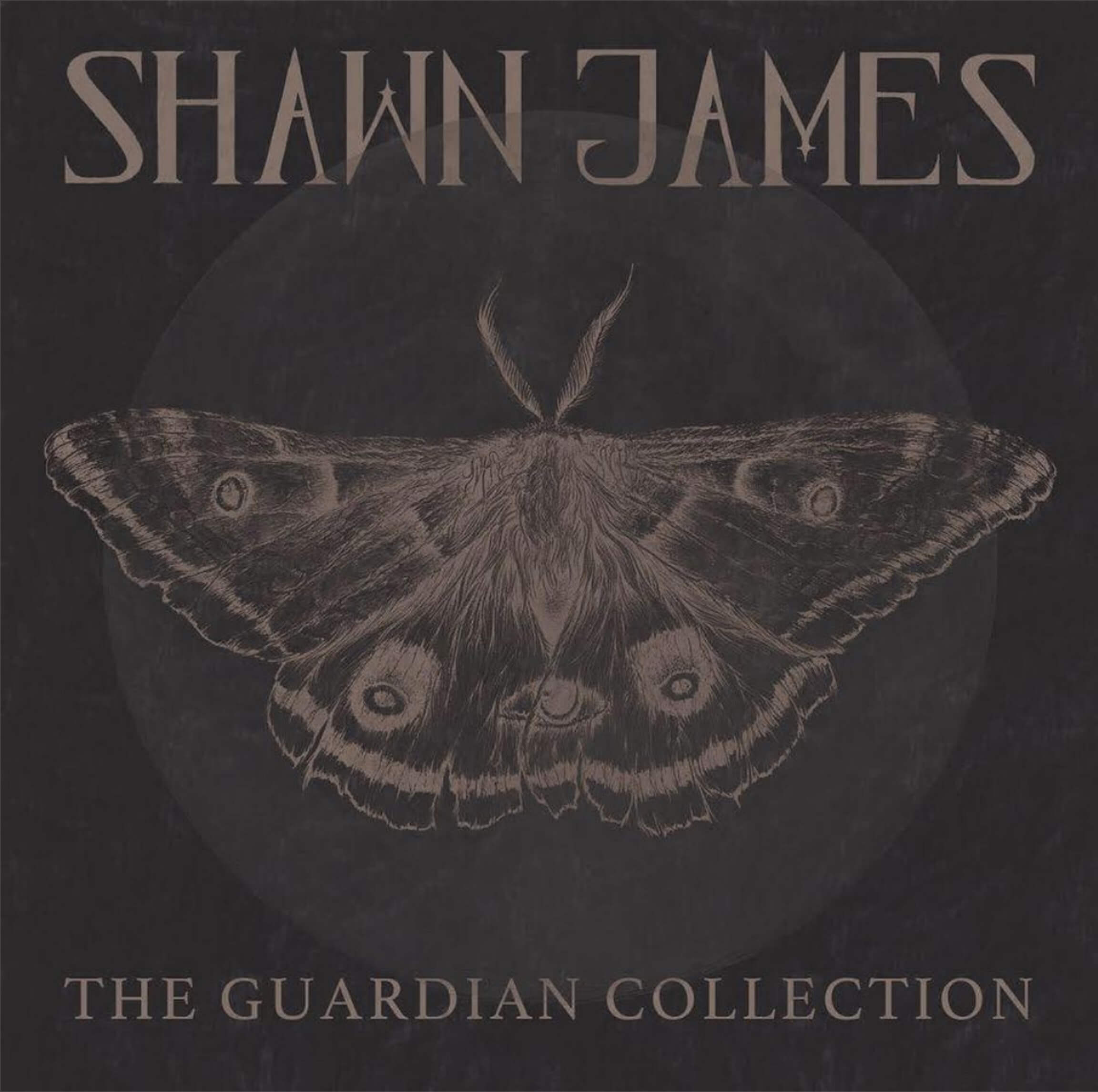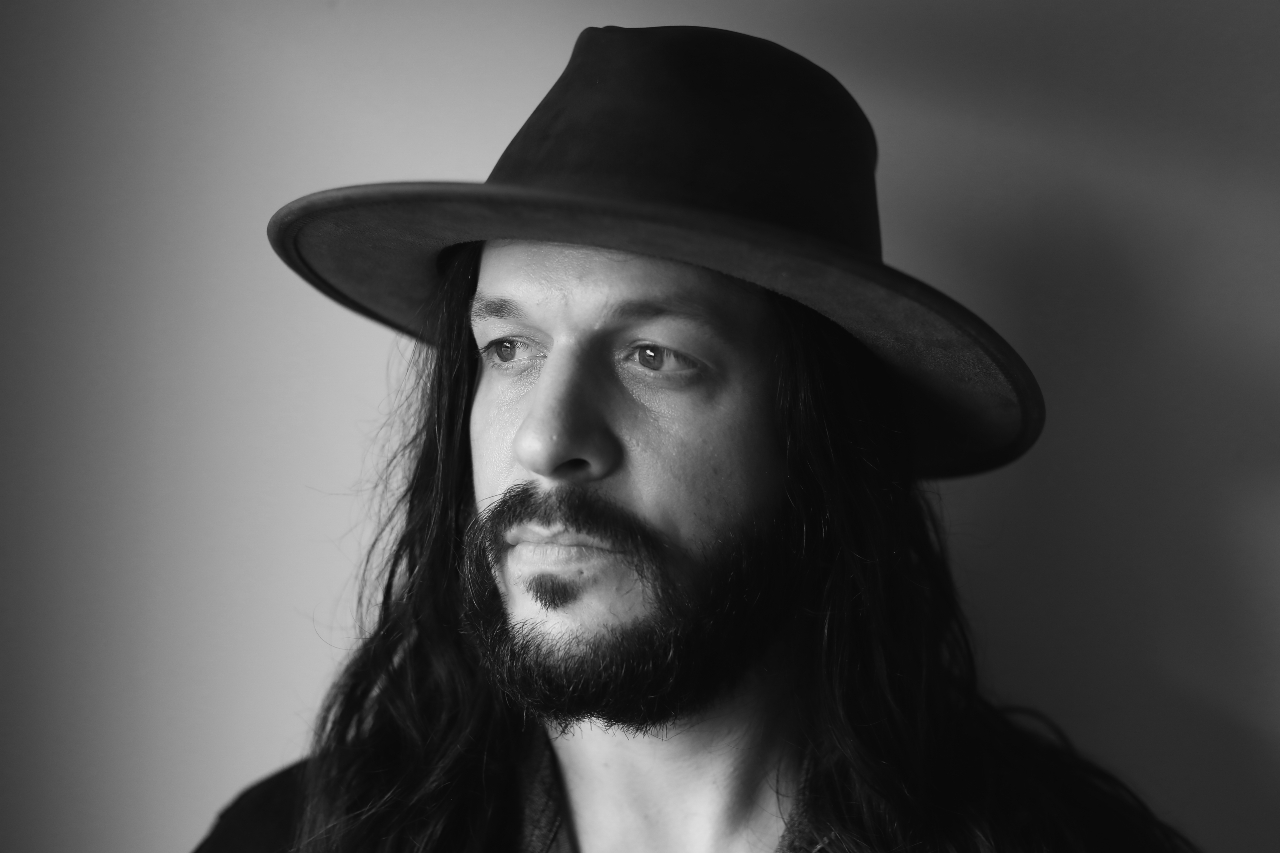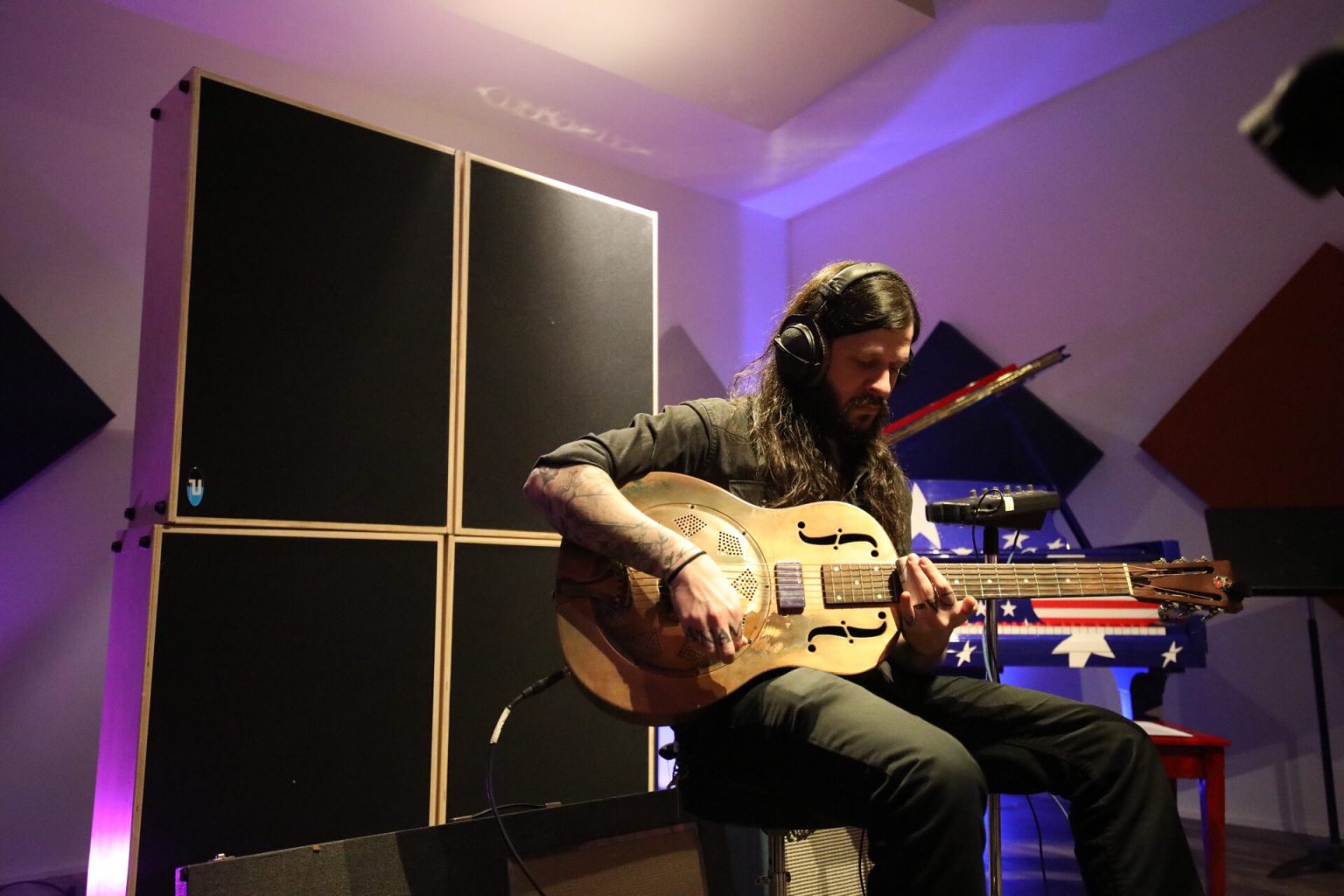Shawn James’ voice is a force of nature, a musical preacher to a flock that accepts everyone, a combination of the gospel choirs he sang with as a youngster and his training in classical music and opera. Born and raised on the South Side of Chicago, James’ timeless sound is steeped in blues legends like Robert Johnson and Son House, forever at the crossroads of damnation and redemption, the two inextricably woven into the fabric of his songs.

After James’ father died, his Greek stepfather introduced him to the Pentecostal church, where his vocal talent was recognized immediately and put to use in the choir. A child prodigy, he entered a number of vocal competitions, with a multi-octave range that makes him unique as an artist. He didn’t start playing acoustic guitar until high school and didn’t start writing songs seriously until he was in his mid-twenties. Studying classical music helped him hone his vocal technique, but he learned to let loose emotionally in church. “I had the mix of both worlds,” he says.
Pointing to “authentic” performers like Tom Waits (“He has an impeccable ‘no bullshit’ compass”), soul singers like Otis Redding, Sam Cooke or Bill Withers, and the old blues icons who inspired him, James explains, “They weren’t precious about what they did; they didn’t put themselves on a pedestal. I want my music to be respected, but I’ll still sit down at the bar to have a beer with you. My goal is to make music that stands the test of time.”
Brant Buckley:
You grew up in the Southside of Chicago. Did Chicago Blues inspire you?
Shawn James:
Growing up in Chicago the number one thing that inspired me was Gospel. I was always in churches. They say that Gospel is Blues dressed up for Sunday. That dipped my toe into Soul music and was the beginning of my journey into Blues. I would go to Gospel churches with my family on the weekends as they were extremely religious. During the week, I would be in the choir and opera learning the technical and classical side of music. It’s an awesome yet weird juxtaposition that taught me about both worlds. I didn’t dive into the Blues until I was in my teens. I was into Muddy Waters, Son House, Robert Johnson, and the Delta players. Howlin’ Wolf was one of my favorites.
Can you talk about your new album The Guardian Collection?
In 2019, I put out an album called ‘The Dark & The Light.’ It was my first record with Parts and Labor Records with producer Jimmy Messer. It was a layered and filled out record and I absolutely love and adore it. I wrote those songs with just an acoustic guitar and my voice. That is pretty typical of me not using a lot of instrumentation, just the bare bones. The songs shone bright in the produced layered way that we made them but the stripped-down core was missing. With ‘The Guardian Collection,’ we stripped down around half of the songs from ‘The Dark & The Light’ that acoustically shone on their own. It gave the songs new perspective.
The other half of The Guardian Collection consists of covers, a re-recorded version of a song called “Through The Valley”, and a new song called “The Guardian” for a Sony PlayStation game called ‘The Last Of Us Part Two.’ It was a really big opportunity for me and a pivotal moment for me. I planned a whole year of touring before the pandemic hit and due to it, I re-recorded some songs and covers to keep the story going and give people something. This is where ‘The Guardian Collection’ came from. When a song is stripped down, I wonder if it can last on its own with just a voice and instrument. The foundation must be solid. That is what I love about this record, these songs are stripped down.
What is your favorite song from it and why?
From ‘The Guardian Collection’ I would have to say it’s the “The Guardian.” Years ago, Sony PlayStation reached out to me wanting to use my song “Through The Valley.” They didn’t tell me what it was for or how it was going to be used. At first, I wasn’t sure. A friend of mine told me it would be huge, I would get exposure, and told me to take the risk. I did and it turned out to be the best thing I’ve ever done. I am not exaggerating when I say it exposed me ten to twenty times in terms of the audience. It was a huge steppingstone. From 2018-2019, I was living in L.A. and that is where the video game company was based.
I met with creative director Neil Druckmann and he was working on the second game which came out earlier this year. He had an idea about a song and that is where “The Guardian” came from. It’s a song that is written from the perspective of the main character in the game. It was new for me. I have written songs before where I have made up a character and I put myself in their shoes and write from their perspective. I had never done it from the angle of someone’s character and story. It was fun and challenging. The game is a post-apocalyptic survival-based game. When I was writing the song, I didn’t want to make it complex. I wanted to make it simple and emotional because of everything that the character was going through. That is how the sound and feel was created and it is my favorite song because it had a very big impact. When it was done, I didn’t realize how musically big and full it became due to the strings on the recording.
In 2016, “Through The Valley” was the trailer to the game and “The Guardian” recording was not used. What they did take were lyrics from “The Guardian” and used them throughout the game as big and momentous events would happen. The main character would go into her journal and she would write the song. I gave them tips as to what a journal would look like. Although they didn’t use the song, they related it to the story which heavily tied it to the song. I am glad I had the opportunity and never imagined it would have turned out the way it did.
What draws you to the sorrowful, soulful, dark, and mysterious?
I don’t know if I have a solid answer. I feel it. The stuff that moves and grips me and makes me feel has always been the heavier Blues and sorrowful Folk. A tiny bit of it comes from the church. A lot of people were going through hard times and I noticed church relieved their heavy emotions and what was weighing on them. It would always come out when the music was playing.
As a young kid that showed me the power of music. I love music that gives you chills. For me, it is the heavier haunting Bluesy style or whatever you want to call it. Life experience also plays a part in it. As a kid when I would go through heavy things like the death of my father, I would turn to music. From a young age it connected me to that kind of music. I formed a bond and attachment. When I am performing, there is nothing like a haunting song where you feel the chills as you are singing it.
Are you channeling when you write, record, or perform? If so, who do you hear within yourself?
In 2016, I recorded an album at Sun Studios in Memphis. I wrote it before knowing I was going there. I was channeling Delta Blues musicians. I wanted to make a record that paid respect and homage to the artists who taught me the power of vocals without big fancy setups. Son House recorded with one mic in a room and you can feel it resonate. For me it is situational. The record is called ‘On the Shoulders of Giants’ and I was absolutely channeling the old Blues guys and the power and the force of it.
I also channeled the simplicity of their music. It was not super complex as it was simple and straight to the point. Because of that, there’s room for the voice to shine and grip you. One of the best ways to learn is to listen and play along to see what they did; maybe mimicking at first by covering the song or singing like them to learn the technical aspect. After that, I love to take that newfound skill and let it sit. I then put my newfound twist on it. It’s not just about learning from the greats but coming up with your own way to interpret it and move it forward. “Orpheus” and “There It Is” from ‘The Dark & The Light’ are groovy Soul Rock songs. I channeled Bill Withers and Otis Redding. It is a song by song, record by record kind of thing that just happens.
What is your songwriting process like?
Again, that is situational. It is rare that I write poetry first. I have done it in the past where it is in a sing song prose format and I apply music to it. That is rare. My favorite thing to do is to write the lyrics and the music at the same time. They impact each other because I feel that there is a fluidity that happens. I will be honest; it is not easy to do. I would compare it to chasing inspiration and motivation. When it happens, that is when my songwriting is at its best.
I have a song called “Flow” and I will take you through it. I was stressed out one day and I walked down to a river with a guitar. I sat there and came up with a two to three chord progression and came up with an idea based off the rhythmic progression. The lyrical rhymes and rhythms started coming out and I wrote the song in fifteen minutes because it was fluid and natural. I didn’t have to think about it and over plan it.
Other times, I get sudden bursts of inspiration. This happened on one of my songs called “Burn the Witch.” I was in Scotland on tour and I was listening to the guy who was opening for me. He had this subtle ghostly haunting thing that I loved, and I couldn’t shake it. The idea came into my head about writing a song from a witches perspective about being burned at the stake and telling it from her perspective. I put the idea in my phone. Most of the time, I get an idea for the song and then I take it back to my cave and develop it. Solitude is a big thing for me when I write. I love to be alone to flush out ideas and think and not feel anyone else in the room. If I am working with a band, it is more of a team effort.

You definitely have an old Blues soul and the church is within you. Can you go more in depth about church?
I was born into it and when I say the church influenced me, musically it did. It doesn’t have to do with the religious aspect. Lyrically, the church instilled in me a love for stories, mythology, tall tales, and the grandiose stories you hear within The Bible. It taught me about storytelling. When I was young, my vision of church was my first exposure to intense emotional baggage being let go. When you think about Blues, they were howling and they had it bad and rough. A lot of the Blues guys I was drawn to were dealing with sorrow and trying to let go. That is what I saw in church. People would cry and scream along to the lyrics. I don’t even have a word for it. To them it was salvation and they were putting it all out there.
One thing you can’t deny is the nature and human quality to it. It was beautiful and that was the way it was dealt with. Music is inspiring and hopefully you can feel it down deep. Music releases and moves things within you and helps you phrase things that you may have not known how to say. It allows you to move past something. It was where I started to see that I had an ability. It was where I cut my teeth because I would learn the technical skills from opera and choir. I felt like I could take the technical ability and try it out in the comfortable atmosphere. The church that I went to was round as you would sing the verse and chorus and then end with a bunch of choruses. The whole congregation sang along. It was really a beautiful thing. As a young boy I was able to learn to just let it out and try stuff.
What did you learn from Townes Van Zandt?
I didn’t really listen to him in my younger days and I discovered him when I was in my mid-twenties with “Waitin’ Around to Die” and “Poncho and Lefty.” What was unmistakable about him was the genuineness about what he was saying. Underneath his delivery are poetic heartbreaking lyrics. He could turn a phrase and deliver it. On top of that, he could perform it and no-one could perform it in that way. Townes taught me about being authentic. Townes was not a healthy individual, as we all know, but he lived his life to its fullest. He was proud of it, claimed it, and was unashamed of the way he presented it. He taught me a lot about authenticity in music and in character. I picked up on the quality of what I was feeling that I heard through him in a different way than the Blues. His Folk thing had a more sudden somber quite reflective quality that was very beautiful to me that I hadn’t necessarily heard before. When high school was over, I was a couple trick pony. When I left home, met different people, and listened to new music is when I started to broaden. He had a big impact on me.
What’s next for you?
Hopefully, I can keep moving forward. I didn’t get into this lifestyle to be famous. I didn’t think that I would ever be doing this. A lot of people grow up thinking they are going to be a rock star or pop star. They train for it their whole lives and their parents make connections. For me, it was about needing it and it helps me get through bad days. It was something already embedded in my life and I truly adored it. Also, I was good at singing. Because I was not chasing it, although I loved it, that is what made it for me. After high school, I didn’t know what to do and my parents were pressuring me as all parents do. I decided to go to audio engineering school. After school, I went to Nashville and had a few internships. I was offered a position and I went home. I was jealous of the people behind the glass and I didn’t want to be there. I wanted to be the one performing and not the one turning the knobs. That is when I went full-fledged into it.
I want to continue what I am doing and keep exploring and developing the sound and the music. I want to explore different genres and incorporate different things. Honestly, this is a dream and I love the lifestyle. I love touring and I love the goods and bads. When you are going through the bad, you don’t love it but when you look back there is nostalgia. I want to keep making music and growing. I want to make people feel and inspire people. Hopefully, I can help release emotions for people. The next thing I am working on is a more Blues-based Rock & Roll groovy Soul kind of sound. Now I am building the groove first and writing to that. It is changing the way I approach it. In the Spring I want to go into the studio and finish this album I have been working on.
Shawn James
*Photo images of Shawn James by Michelle Mavrides courtesy of Parts + Labor Records


